- Home
- Luis Alberto Urrea
Into the Beautiful North Page 24
Into the Beautiful North Read online
Page 24
They were not amused by Fruita. Nayeli kept trying to pronounce it in Spanish: Frooweetah! Parachute failed to intrigue them. The Book Cliffs, the Roan Cliffs, and mighty Battlement Mesa tried to amaze them, but Tacho and Nayeli were blind with shock and embarrassment. The land itself seemed to rebuke them. Every car that passed, they were sure, was dense with curses and accusations.
Wisely, Tacho pulled off at Rifle for Eskimo Pies and a visit to the trading post. Nayeli, caught up in patriotic guilt, bought a silver plastic rendering of the twin towers and mounted it on the dashboard. She attached an American flag decal to the windshield. Tacho bought a T-shirt with a picture of armed Apache warriors on it. It said: homeland security since 1492. It never crossed his mind that Geronimo and his warriors would have killed him in a second.
Chapter Twenty-nine
Chava Chavarín polished his best loafers for the fifth time. He spit on the leather and took a chamois to the uppers. He uncapped a shoe polish roller and carefully colored the edges of the soles. He made the heels look like new. He placed his shoes on folded newspapers on the table and let them dry. He tipped Quinsana foot powder into them so his feet would smell fresh. He chose white briefs fresh out of the package, and he pulled on long black nylon socks that rose well above his calves. He tugged on a snug white undershirt that helped control his small paunch, tucking the undershirt into his skivvies before putting on a peach-colored cotton shirt with slight cream stripes. He had dry-cleaned a handsome pair of pleated pearl gray slacks and added a brown belt with a faux gold coin buckle. His pocket handkerchief was also peach. Behind it, snug to his thigh, he inserted a gold money clip with seven crisp twenties, two tens, three fives, and ten new ones. His slimmest leather wallet went in his left back pocket. He had bought an Invicta Dragon Lupa watch from a television shopping network. It was massive, a watch Ronald Colman himself might have worn, its magnifying crystal face making the thing look even more massive. His tie was off-white and picked up the thin stripes of his shirt. He at first rejected a tie clasp as too flashy, then decided afree-flying tie was simply too risqué, debauched even. He clipped the tie with a fine gold scroll that spelled out chava, a small shining zirconium tucked in each A. Chava added a pale turquoise breast pocket hankie to the ensemble and regarded himself in the mirror. “Nice,” he whispered. “Very nice.” He spritzed himself with Aqua Velva. “There.” He was as ready as he would ever be. He combed his tiny mustache one last time. He made moochie lips at himself in the mirror: the mustache squirmed on his face like a caterpillar, as if it were 1961 again! He grabbed his keys and whistled some old sentimental favorites to build up his spirits. He locked the door and started downstairs and only realized when his feet hit the grass outside that he’d forgotten to put on his shoes.
He was all right driving to the hotel. It was another blue San Diego day, the glittering bay and the white sand and the gulls and the kites and the girls and the breeze in the palm trees. One white cloud hung above it all like some sort of angel. Why, it was almost like Mazatlán! Only better! ¡VIVA LOS YUNAITES ESTAITES NORTE AMERICANOS!
He felt a little shaky pulling into the Bahia Hotel’s lot, imagining his Mighty Irma watching him from a window. His lost Irma. Queen of Strikes! Empress of the 7-10 Split!
Which room was hers? He parked and tried to rise from the car in one fluid motion, as if he were still dancing like he’d danced on those tropical nights so long ago, as if the years had not piled on him and tired him, as if his hairline were not thin and gray and flashing bright spots of light where the sun hit his scalp. He squared his shoulders and set his jacket and strode toward the doors, all the while feeling eyes, phantom eyes, burning into him from every direction. He maintained his splendid stride and positioned one flat hand before his belly like a blade, thus emphasizing the excellence of his slim physique.
There was no one in the lobby. He boldly stepped to the desk and announced her name. The young man called her room and murmured to her. It was like a Humphrey Bogart mystery!
“Yes, ma’am,” the young fellow said. He hung up the phone. “Room two twenty-seven,” he intoned.
Chava Chavarín slapped his fingers on the counter and grinned with less verve than he would have preferred. He turned in sheer terror and lurched toward the elevator.
He tiptoed down the hall. There was still time, he promised himself, to leave. He could clear out his apartment in a matter of hours and head up the freeway to San Francisco. 219. 221. He smoothed his mustache. 223. He coughed. 225. He needed to pee. 227.
He stood there and shook himself, got ready to knock.
The door burst open.
Atómiko bopped out.
“¿Qué onda, guey?” he said and went on down the hall.
Irma called from within:
“Chava? Is that you?”
He stepped away from the door. He turned right, turned left, headed back toward the elevator. Atómiko was standing there. He shooed Chava back toward the room with his hands.
“I’d hit that nookie if I was you, pops!” Atómiko yawped. The elevator pinged. He got in. “Good luck,” he said. The doors closed.
“CHAVA CHAVARIN,” Irma’s voice boomed, “YOU COME HERE THIS INSTANT!”
He turned.
She stood in the doorway. Forty pounds heavier. Dyed. In tight black stretch pants and a large loose red satin top. Magnificent.
He smiled.
Took a step.
She blushed.
Oh, my!
She giggled.
Oh, you’ve still got it, Chava!
His step lightened. He rolled up and bobbed down. He glided. When he got close enough to smell her lilac eau de toilette, he said, “Hello, my love.”
She rushed back into her room.
He followed.
Quietly, he closed the door.
Chapter Thirty
The next day, Nayeli and Tacho left Grand Junction and rose to Glenwood Springs. The mountains had teased them, stepping close and jumping away, until suddenly there they were, in all their dread and mass: the great Storm King brooding over the steaming hot springs while a small wildfire worked the canyons behind the Burger King. Nayeli and Tacho sat on a cement table and watched helicopters drop buckets of water on the thin line of flames. A group of metal chicks in black T’s and wallet chains slurped milk shakes and smoked. They all looked upslope at the copters.
“Hey,” one of them called. “You guys Pakistani?”
Tacho shook his tail feather and said, “Mexican! Queer, too!”
“Wow,” she replied, flicking some ash. “Don’t tell my dad that.”
The helicopters whopped in the sky, their blades flickering silver in the sunlight.
“How you likin’ that burger?”
“Is like God cook it!” he enthused.
“Dude, you’re a riot.”
Everyone basked in cross-cultural bonhomie.
“Later,” the chicks called as they hove to their feet and shambled away.
Tacho drove into Glenwood Canyon, along the cantilevered freeway; to their right, the Colorado River surged green and cold, and across the water, a yellow locomotive pulled a train into the side of a cliff and vanished.
Nayeli said, “Why do they call the river ‘red’ when it’s green?”
“It’s the USA, morra,” he said. “They do whatever they want.”
Rafters bobbed along. Apparently, an avalanche had recently destroyed part of the elevated roadway. A road crew stopped the traffic. Tractors and trucks beeped and huffed. Far uphill, a guide vehicle began to lead the oncoming line of traffic along the single open lane. To their left, as they sat in the ticking traffic jam, Storm King and his minions formed a solid wall of rock. Aspens flounced all around them, peeking their heads above the sides of the highway. Their little yellow leaves, in the light, flashed like soft coins.
Suddenly, a mayfly hatch burst out of the gorge. Millions of mayflies. Gold, shimmering, they rose from the water of the Colorado in swirls, w
afting like metallic snow blowing up into the sky, silent.
Nayeli could not stop laughing.
“Look how beautiful!” she cried. “This is some kind of sign. No? God making a miracle for us.”
A Native American in a hard hat waved them ahead. Tacho slowed and showed him his Apache Homeland Security T-shirt. The man gave him a thumbs-up. “Yes!” Tacho enthused.
They drove on, higher and higher. Nayeli could not breathe. They were too high. She had never been so high. It gave her a headache. Her lungs could not pull enough dry air into her body. It made her dizzy. Tacho grimly clutched the wheel and leaned into the climb, as if he could force the straining minivan up the increasingly impossible slope.
But they hadn’t seen anything yet. Ravens, hawks, eagles. Deer beside the road. Evergreens took over from cottonwoods and aspens: great lodgepole pines stood straight as spears. They topped off one of the many rises and beheld before them huge saffron valleys and ranges of mountains with vivid snowcaps on their points marching to infinity. The sky was fractured in great blocks of cloud—chunks of white, blue, orange, violet. Nayeli gasped. She began to cry upon sight of it.
“Is it always like this?” she asked no one in particular.
Suddenly, Tacho shrieked: “Oh, my God! Mountain goats!”
There they were, three cranky little mountain goats, off-white and dirty, their beards bobbing as they munched roadside flowers and pondered the passing cars.
At the Frisco rest area, they peed madly and were ambushed by marmots. Nayeli thought they were beavers. She opened a packet of Twinkies and was about to eat one when a camp robber bird dive-bombed her and stole the treat and flew away. The thief was immediately chased by two immense magpies, looking like black-and-white cows in the sky.
“What is this,” Tacho said, “the garden of Eden?”
The Eisenhower Tunnel waited for them at 11,015 feet. The Continental Divide. TURN LIGHTS ON IN TUNNEL.
“¿Un túnel?” Nayeli asked.
Tacho pulled on the lights, and they plunged in. But it was well-lit, tiled as handsomely as a restroom.
“Ooh,” he said. “Scary.”
Idiots in front of them and behind them started honking their horns to hear the echo. So did Tacho. Nayeli powered down her window and hollered. “¡Ajúa!” she cried.
They burst out and were hit by sun as heavy as a bomb.
“Holy crap,” Tacho noted.
Watered vales of cottonwoods and aspens and houses with colorful wooden trim. Down, down; Tacho had to put it in low so he didn’t fry the brakes.
BUFFALO OVERLOOK.
“Look at that sign!” Nayeli cried.
BUFFALO BILL’S GRAVE.
“¿Quién?” Tacho asked.
Nayeli shrugged.
“Buffalo! Buffalo!” she shouted.
Tacho sighed—dad had to keep the kids happy—and pulled over. They parked and got out, and there it was—the Buffalo Bill Buffalo Herd. Monsters, all. Wise looking with their great beards and foul, stinking humps. Nayeli hung on the chain link. The beasts ignored Tacho’s kissy noises and moved along the grassy hillside like languid tugboats in a harbor.
A blue jay scolded Nayeli as she collected pinecones from the gravel.
Tacho noted: “Here, even the birds hate Mexicans.”
It was dusk before they knew it, and cold. Indeed, Nayeli could not believe how cold it was. “I’m shivering!” she said. It was a first. Tacho fiddled with the knobs until hot air jetted out of the dashboard. “Look!” Her arms were covered with goose bumps. Frankly, Tacho could not see what Nayeli found so charming about freezing your ass off.
They found a motel on a dark purple defile in the mountain foothills near Golden, and they booked themselves as “Mr. and Mrs. Vicente Fox.” The friendly woman at the desk offered them each an orange. The office was in the living room of her unit. Behind her, they could see an old man with an oxygen tank, staring at the flickering light of a television set. The office smelled like tuna casserole. A small hand-lettered sign on the wall said: IF YOU DIED TONIGHT, DO YOU KNOW WHERE YOU’D GO?
“Where you kids headed?” the woman asked.
“Estes,” said Nayeli. “Is right? Estes?”
The woman smiled.
“I bet you never saw nothin’ like Estes Park in Iraq!” she bellowed. “Paw Paw,” she called to her old man. “These Iraqi kids is going up to Estes Park!”
“That right,” he muttered.
He waved one white hand.
“Bless your hearts,” he said.
“He’s real sweet,” the lady confided.
They went down the road and filled the tank at a BP station. Nayeli bought sandwiches, cookies, Fritos, and Cokes in the food-mart. Tacho was miserable and freezing and tired. He drove back to the motel in a sulk and rushed into room 113 and ran himself a hot bath. Nayeli ate her sub and watched Captain Jack Sparrow on HBO.
Her father was still a million miles away.
Thank you for driving me,” Nayeli said.
“Don’t mention it,” Tacho replied.
They followed Matt’s directions. They skirted the Front Range of the Rocky Mountains without knowing the name of what they were seeing. Nayeli thought of it as the Sierra Madre. Tacho thought of it as the Mountains. They didn’t care for Boulder—too much traffic, too many skinny people jogging in ridiculous clothes. At Lyons, they turned up the mountains and again found themselves climbing, among vast spikes of pines, dark, nearly black. Bright pale granite upthrusts. Butterflies burst from the weeds beside the precipitous highway like little scraps of paper. Everywhere, relentlessly, crows. Nayeli had never seen glaciers. Again, her head ached, and she had trouble breathing, as if she had just run up a staircase. “Waterfall!” she cried over and over. The Rockies, apparently, never ran out of little waterfalls.
Just when they thought they would never get there, they swooped down a great curve to the left: before and below them, a valley rimmed by brilliantly snowy peaks. In the heart of the valley, a turquoise lake. Nayeli caught what breath she had left. Yolo had once made her read a translation of Heidi, and this big valley in the mountains looked like the paintings in that tattered old book. Just for a moment, she thought what almost all travelers on that road think when they break through the pines and behold the great vista before them: I will live here.
In the valley, the lawns along the edges of the lake were crowded with great shaggy animals that looked like horses with antlers.
“Can we pull over?” Nayeli the Nature Girl asked. “What are they?” she wondered.
Tacho’s butt hurt. He was bored. Mountains, he thought. Motels. Big ugly deer. Gringos. He wondered who was running his restaurant, now that Irma was in San Diego. He wondered if the giant iguana was lurking inside his shelves.
“They’re robots,” he said. “Put there to lure suckers into town.”
He was delighted to say to himself: Bitch!
Nayeli jumped out and instantly regretted it. She was freezing. The icy wind dropped off the snowy peaks and raced over the choppy water of the lake. The big animals ate grass—she could hear their teeth working. They were magnificent.
A sole fisherman stood on the edge of the water, ignoring her and the beasts. He wore a big army coat and had a gnarly beard and a nose burned a few thousand times by the sun. He turned his head.
“Hello,” she called.
He eyed her.
“How do,” he grunted.
Reeled in some line and cast again.
“Please?” she called. “What is? What… are?”
She pointed at the beasties.
“Ain’t you cold, sweetheart?” the man replied. He pantomimed a shiver.
“Yes.”
There went that smile. She pulled it down, but it sprang back up. He smiled. That was some cute señorita, he told himself. He set his pole against rocks, walked to his truck, and fished out a hoodie sweatshirt.
“C’mere,” he said. “I won’t bite ya.”
She glanced at the minivan. Tacho seemed to be asleep. She cautiously came to the big man.
“Here,” he said. “Put that on ’fore you die of cold.”
He tossed it to her.
She pulled it on. It said STEAMBOAT SPRINGS on the chest. SEARCH AND RESCUE. There was a picture of a Saint Bernard on the front of it. The hoodie’s hem fell to her knees. She had to bunch up the cuffs. To the fisherman, she looked like some kind of elf.
“Gracias,” she said.
“De nada,” he surprised her by saying. “And don’t say I never gave ya nothin’.”
This seemed to amuse him.
She pointed at the animals.
“Please?”
“Them’s elk.”
“Elk?”
“Uh-huh.”
She rushed to the van and checked her book: alce. She had never heard of an alce, even in Spanish.
“Son magníficos,” she said to the fisherman when she came back.
“Good eatin’,” he said. “Marinate you an elk steak in wild blueberries for a night, then grill it. Oh, yes.”
In less than ten minutes, he was teaching her how to fish. He showed her where the eagles came down to the water from the cliffs. He told her that condors had been seen there, too—that they’d probably sneaked through the Rockies all the way from California. Somehow, she understood what he was saying. When it was time to go, he gave her a hug and she kissed his cheek and realized halfway across the big valley that she didn’t even know his name.
They drove to the main gate of Rocky Mountain National Park. The female ranger in the booth took Tacho’s money. He just held out a sheaf of bills and said, “Please?” She counted out the proper amount and handed him his change and a nifty map. Neither of them was ready for what they found inside the park. Insane peaks, more glaciers, more elk, eagles, deer. Tacho, nature hater that he was, shrieked when he saw a bobcat sitting primly on top of a tall rock beside rushing water.

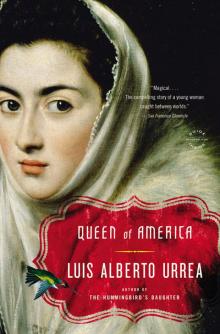 Queen of America
Queen of America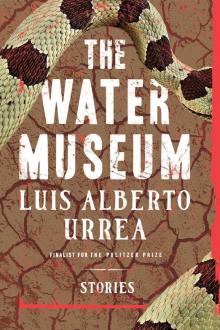 The Water Museum
The Water Museum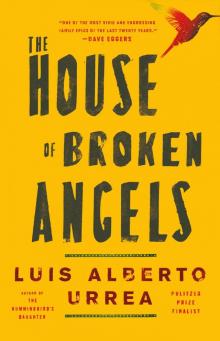 The House of Broken Angels
The House of Broken Angels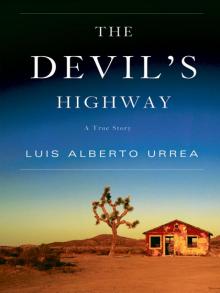 The Devil's Highway: A True Story
The Devil's Highway: A True Story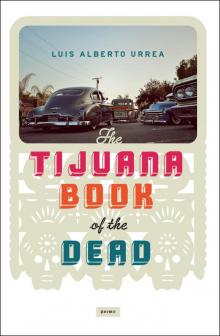 Tijuana Book of the Dead
Tijuana Book of the Dead Into the Beautiful North
Into the Beautiful North